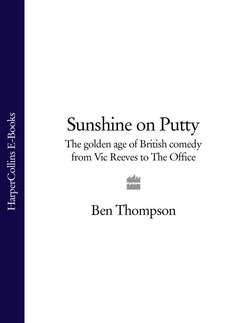Читать книгу Sunshine on Putty: The Golden Age of British Comedy from Vic Reeves to The Office - Ben Thompson, Ben Thompson - Страница 10
At Last, The Theodore Hook in 1812 Show
ОглавлениеIn the mid-1960s, when John Cleese and a group of his up-and-coming acquaintances (including the brace of comic colossi who would later be known as The Two Ronnies) were looking for a title for their shiny new topical TV revue, they called it At Last The 1948 Show in a bid to sum up frustration (previously and more vehemently expressed by their non-Oxbridge-educated role model, Spike Milligan) with the slow-moving institutional nature of the BBC.
Any true appreciation of what is or is not golden about the Reeves/Office age will have to avoid overestimating the differences between this and other periods of comedic endeavour. Especially as one of the main creative themes of the period will prove to be reconnection with preceding generations after the supposed ideological breaches of the 1980s.
Consider the brilliant career of nineteenth-century rabble-rouser Theodore Hook, editor of such outspoken publications as John Bull and The Arcadian. A. J. A. Symons’s 1934 biographical essay15 outlines an armoury of comedic attributes which will not be unfamiliar to comedy aficionados of the present day.
Alongside the mid-stream political horse-swapping of the aforementioned Mr Rory Bremner (‘his power of producing in parody a complete House of Commons debate, imitating one speaker after another…taking off Peel, Palmerston or the Duke [of Wellington] without a moment’s pause’), the eagle-eyed might discern the poker face of Jack Dee (‘his extreme power of keeping a straight face when all his listeners were eclipsed in mirth’), or the institutional subversion of Chris Morris. (Taking up position on an empty cart by the roadside, Hook once posed as an itinerant preacher. Having assembled a suitably rustic audience, the metropolitan mischief-maker ‘suddenly altered the tone of his voice, thundered the most appalling curses at the throng and ran for his life’.)
Even the legendary drinking prowess of Johnny Vegas gets a look in. Symons describes Hook ‘drinking experimental gin and maraschino cocktails by the pint with an American bon vivant, before dining soberly at Lord Canterbury’s where he ascribed his poor appetite to “a biscuit and a glass of sherry rashly taken at luncheon”‘.
This is not to say that life was necessarily richer or more satisfying – comedywise – in the early 1800s, but it is probably worth bearing in mind that the late twentieth century was not the first historical moment at which the professional laughter-maker has loomed large in our culture. The medieval scholar Erasmus disparagingly described the mid-thirteenth century as a time when ‘Fools [i.e. jesters] were so beloved by great men that many could not bear to eat or drink without them, or to be without their company for a single hour’.
The picture of the wearer of cap and bells painted in R. H. Hill’s Tales of the Jesters - ‘Stealing titbits from the kitchen, falling into fits of violent fury without reason, breaking furniture and crockery, fighting with the pages and worst of all giving himself insufferable airs’ – will not be wholly unfamiliar to anyone lucky enough to have spent time with Britain’s turn-of-the-millennium comedic élite.
Elements of unexpected continuity are just as rich a source of fascination in the history of comedy (or, indeed, anything else) as unarguable new departures. To achieve a true understanding of the achievements of the Reeves/Office epoch, it will be necessary to delve deeply into the historical (as well as the comedic) background of the previous half-century – from the victorious memory of the Second World War to the traumatic loss of the British empire; from the bright new dawn of the swinging sixties to the sour fag-end of Thatcherism. At the same time, the dramatic unfolding events of the 1990s and early 2000s will be recounted – wherever possible16 – in the present tense, in the hope of capturing the immediacy with which these developments were initially experienced.
If by these means it were somehow possible to root the glorious comic legacy of this illustrious era in timeless verities of national character and cultural heritage, well, that would certainly be a goal worth aiming at. In his lofty 1946 panegyric The English Sense of Humour, Harold Nicolson describes that most oft-speculated-upon of national attributes (whose ethnic remit is, for the purpose of this volume – and in acknowledgement of the partial success of Tony Blair’s devolutionary reforms – graciously also extended to the Scots, the Welsh and even the Irish) as ‘existing at a level of consciousness between sensation and perception’.
In the hope of getting across how this idea worked, Nicolson came up with a novel illustrative formula. To approximate what he called the ‘simultaneous awareness of doubleness and singleness’ which it entailed, he invited his readers to enjoy for themselves ‘the curious sensation produced when we cross the middle finger over the index and then push the v-shaped aperture up and down the nose’.17
